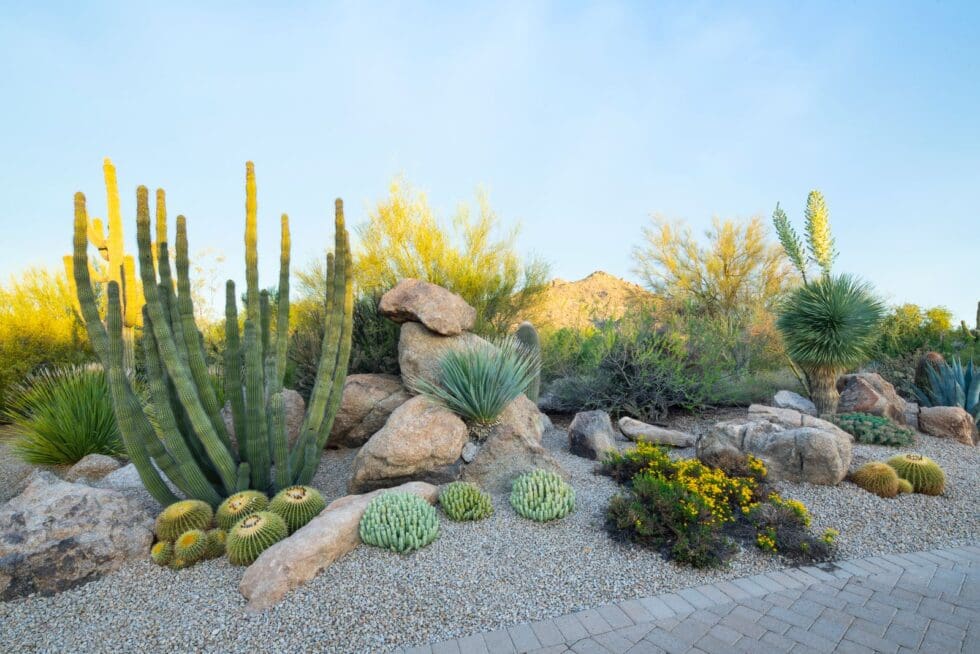
Pros & Cons Of A Lawn-Free Yard
Lawn-free front yard designs have become increasingly popular, offering homeowners numerous benefits – especially those residing in the Sonoran Desert. By eschewing the traditional grassy lawn, individuals can experience advantages such as water conservation, decreased maintenance, and extra space for other features. However, it’s essential to acknowledge potential drawbacks, including aesthetic considerations, initial costs, and the necessity for meticulous planning and design. This article will delve into the pros and cons of a lawn-free front yard design to help you determine if it aligns with your preferences.
Pros
Water Conservation: An obvious benefit of a front yard design without a traditional lawn is the substantial reduction in water usage. Traditional lawns demand frequent watering to sustain their vibrant green look, especially in arid climates. Choosing alternatives like native plants, drought-tolerant landscaping (xeriscape), or hardscaping allows homeowners to significantly diminish their water consumption. This not only supports water conservation initiatives but also has the potential to reduce water bills.
Low Maintenance: Traditional lawns necessitate consistent maintenance tasks such as mowing, fertilizing, and weed control. On the other hand, a front yard design without a traditional lawn requires minimal upkeep. Native plants and other landscaping elements generally demand less attention and are better suited to local environmental conditions.
More Space For Other Features: A lawn-free front yard unlocks opportunities for incorporating additional features and functionalities. By eliminating the lawn, homeowners gain the flexibility to establish outdoor living spaces, gardens, play areas, or amenities such as seating areas, pathways, or water features. This broadens the scope for personalized and functional designs, catering to the specific needs and preferences of the household.

Cons
Appearance: The visual appeal of a lawn-free yard is subjective and may not appeal to everyone. While some individuals may admire the natural allure of native plants or the contemporary aesthetic of hardscaping, others might favor the timeless and neat appearance of a well-kept lawn. Prior to embracing a lawn-free design, consider your personal preference.
Upfront Cost: Shifting from a conventional lawn to a front yard design without traditional grass may entail initial expenses. Depending on the chosen alternatives, there could be costs related to removing the existing lawn, acquiring new plants, obtaining materials for hardscaping, or enlisting professionals for design and installation. Though these costs may fluctuate, it’s crucial to incorporate them into the budget and weigh them against the potential long-term savings in maintenance and water usage.
More Planning & Designing: Achieving a successful front yard design without a traditional lawn demands meticulous planning and thoughtful design. Homeowners must take into account variables like soil conditions, sun exposure, drainage, and the unique requirements of selected plants or landscaping elements. In the absence of careful planning, there is a potential for inefficient water management, inappropriate plant choices, or maintenance challenges. Addressing these concerns may necessitate further research or seeking the guidance of a professional designer or landscaper.

Opting for a front yard design without a traditional lawn brings forth numerous advantages, such as water savings, decreased maintenance, additional space, and diverse alternatives. Nonetheless, it’s crucial to take into account factors like personal aesthetic preferences, upfront costs, and the necessity for careful planning and design. By carefully evaluating these pros and cons, homeowners can make an informed decision on whether a lawn-free front yard aligns with their landscaping preferences. No matter what type of features you dream of incorporating into your outdoor living space, Desert Foothills Landscape can bring your dreams to life. Contact us today to get a quote (480) 488-0128.
